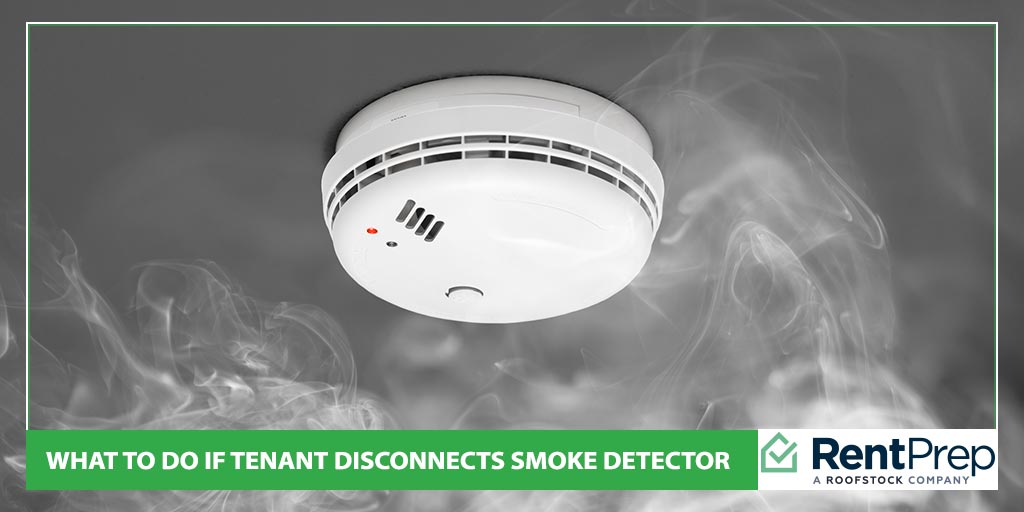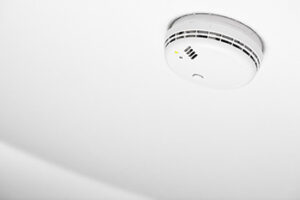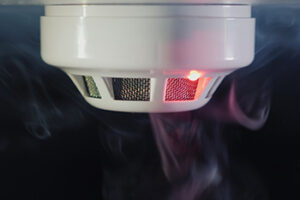
Smoke detectors are a necessary part of keeping your renters and property safe. But, unless included in the lease, there is often confusion about who is responsible for installation and upkeep of these critical devices.
Ultimately, the hope is that a smoke alarm will protect your renters, their property, your property, and your home from the threat of fire. Upkeep of this small device can make the difference in devastating losses and injury.
But how can you check that your tenant is consistently testing the fire alarm? What can you do if your tenant continuously disconnects the smoke detectors? Keep reading for some of our top tips on maintaining smoke alarm accountability.
Table Of Contents For Tenants Disconnecting The Smoke Detector
- Smoke Detectors: Who Is Responsible?
- 5 Things You Should Know About Tenant Smoke Detectors
- My Tenant Removed The Smoke Detector. What Are My Rights?
Smoke Detectors: Who Is Responsible?

The most important thing to remember about smoke detectors is that the laws and responsibility vary by state – and sometimes even by county. The First Alert web site is a good place to start when researching smoke and carbon monoxide alarm requirements for your state. Legislation is updated almost yearly by state – so be sure that you have the most up-to-date information to protect both yourself and tenants in the case of a fire.
- Who is responsible for installing the smoke detector? In most (if not all) states, the landlord is responsible for installing the initial smoke detector and verifying that it works properly. Laws about placement and type of fire alarm vary by state. In California, battery-powered and wired smoke alarms are required outside of every bedroom, as well as in hallway areas. Standard issue alarms are now 10-year lithium battery and tamper-resistant.
- Who is responsible for regular testing and changing the batteries? Renters are tasked with the responsibility of testing alarms and changing batteries. Since landlords have to follow a 24-hour notice for entering the rental property (unless in an emergency), the tenant should be the one to regularly check the alarm.
- Does the smoke detector need to remain connected at all times? Yes. Most importantly, if the smoke alarm in your property is disconnected, it could result in criminal charges if there is a fire on the premises. Although it is not illegal to disconnect a smoke alarm (for example, if you experience smoke with burning food), the detector should generally remain connected all the time.
- Who should replace the smoke alarm if it breaks? In some states, this will vary lease-by-lease. In other states, the landlord is mandated to fix the smoke alarm if it breaks. For example, in Maryland, landlords are required to replace the smoke detectors in five calendar days after notification of repair. In other states, the landlord has 15 days to replace the faulty alarm.
Check out this guide on rental smoke alarm basics – including what you can include in your lease! But what can you do if your tenant continuously disconnects the smoke detectors?
5 Things You Should Know About Tenant Smoke Detectors
- You must ensure that, upon each new rental agreement, smoke alarms are in working order. You might even want to include this in the lease! Have the tenant test the smoke detector and initial beside a clause in the lease that states that smoke alarms are working. This will protect you from any potential lawsuits should there be an emergency situation.
- Smoke alarm placement and type cary by state. Check your state’s requirements to ensure that you are following protocol with placement and alarm requirements.
- Tenants are generally responsible for replacing smoke detector batteries. Show your tenant how to test the fire alarm upon move-in (normally, it can be done with the push of a button) and ask that they do it bi-weekly, or even monthly. This will prevent any confusion surrounding dead batteries or alarms that fail to trigger.
- You are responsible for replacing a broken alarm. But, it is the tenant’s obligation to give official written notice of a broken fire alarm. Tenants must diligently test the detector, replace batteries, and monitor smoke detectors so they can report broken alarms in a timely manner.
- A tenant removing a smoke detector is illegal in most states. As long as you provide tenants with 48-hour notice, you are able to enter the property and check that the smoke detector is functional. In the event that it is removed, you can provide the tenant with 10 days to re-attach the smoke alarm or vacate the premises.
My Tenant Removed The Smoke Detector. What Are My Rights?

What can you do if your tenant continuously disconnects the smoke detectors? The long and short of it is – if the problem is prolonged and you have spoken to the tenant in writing, you may be able to start the eviction process.
Technically, if a tenant is caught with a removed fire alarm, they have a set number of days (depending on the state) to put the alarm back. In the case of a month-to-month lease, landlords might also be able to evict immediately, if needed.
If you have already asked the tenant to replace the fire alarm on the wall and they have not complied, you may consider asking the local fire department to do an inspection at the property. This could give the tenant perspective on the importance of this device and the legal issues that might follow not complying with state laws.
You may wonder, “But what if my tenant keeps removing the smoke detector?” If this is the case, you have options – including fining the tenant.
How To Fine Tenant For Smoke Detector Tampering
If you find yourself in the situation of a tenant who continually removes a smoke alarm, be sure to consult with a rental lawyer. Knowing your and the tenant rights in your state can help you understand how and when to fine your tenants for multiple occurrences of disconnecting a fire alarm.
In California, for example, landlords may assess health and safety violations for disconnected smoke detectors ranging from $250 to $15,000. Of course, it depends on the circumstance and if there is an actual fire or damages, but be sure to consult a lawyer and your state’s laws if you face this as a perpetual problem with your tenants.
Key Takeaways
Because smoke alarm laws vary by state, this can be a confusing topic for landlord/tenant relationships. It’s important to know your rights and ensure you and your tenant are both playing by the rules.
While you are likely responsible for the initial installation of a smoke detector (or replacement of a broken one), the tenant is responsible for testing the alarm and changing batteries. If your tenant removes a smoke alarm, you may be entitled to fining them or ultimately evicting them to protect the safety of all people and property involved.

